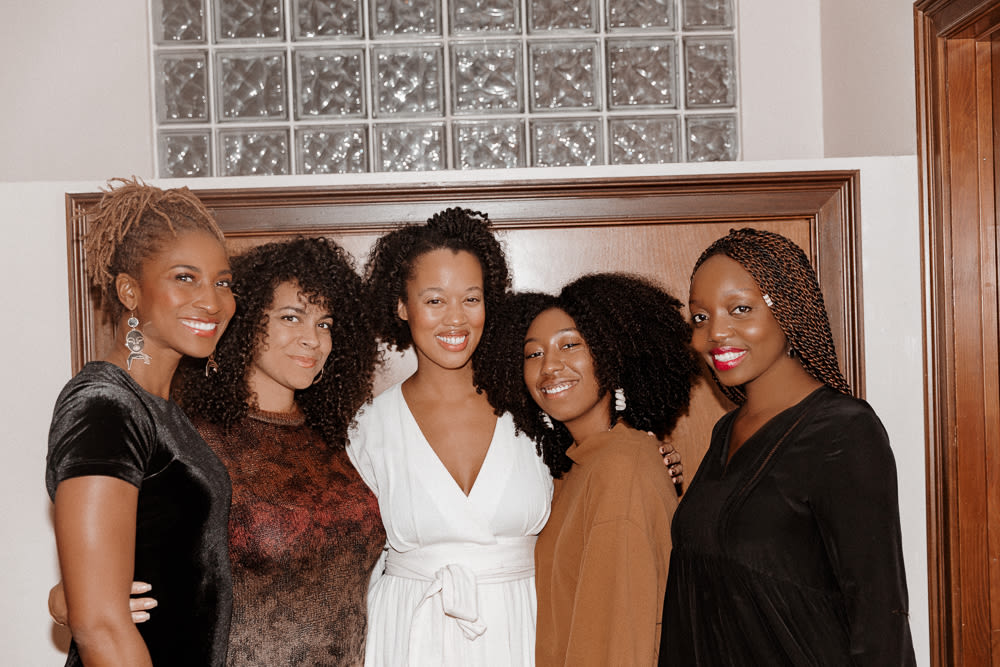Some terms get thrown around pretty easily these days—“jade rolling,” “that’s a bop,” “Finsta,” et al. Does one really know what any of them mean? (Well, sort of). One that tends to dredge up some confusion is “self-care,” winner of the "What's That Mean??" Marketing & Instagram Buzzword of the Year 2018. It’s been distilled, repurposed, and re-interpreted in so many ways that it’s hard work to get to the root of it. And it's not even a new term! Audre Lorde famously spoke on it in 1988, saying “Caring for myself is not self-indulgence, it is self-preservation, and that is an act of political warfare.”
Fast forward 30 years—does self-care really mean vegging out with a Housewives marathon and a manicure? Should it mean something more? Fortunately, there are folks with answers. Like Lauren Ash, the founder of the Chicago-based wellness hub, Black Girl In Om (BGIO). Every year BGIO celebrates change-making women with what they call “The List.” Five of the 26 women on The List—entrepreneurs, nutrition warriors, health experts and the like—were up for chatting with ITG about what the term self-care means to them. So lay back and scroll down. Note-taking is encouraged!
"The term ‘self-care’ is so tricky because in this day and age, any sort of phrase—be it ‘self-care’ or ‘black girl magic’—gets co-opted so quickly. It's hard to separate the true meaning of it through all of the marketing noise swirling around it. It's not just about taking baths and doing your nails. It's about finding processes in your life that make you the most productive and happiest version of yourself. Making lists the night before is my go-to. If I don't do a list the night before, I feel entirely lost with what the next day holds, and I wake up with a lot of anxiety. Especially still being a two-person company and running a lot of that, there's always a lot going on, there's always a lot of stress. The biggest thing I can do to take care of myself is to make sure I'm managing all these little pieces, and to also acknowledge when I have too many balls juggling at once. Being able to prioritize has been key for me. As one person, I just can't take on every opportunity that's presented in front of me.
It really comes down to the simple concept of doing what's going to help you feel best, and be the best person, friend, significant other, daughter, that you can be. I almost think that the more we try to create language around it, we almost complicate it. And it's more about gut instincts than trying to define it. As someone who's underrepresented, especially in the world of entrepreneurship, there are really unique challenges to moving through those spaces, and creating your own rituals around self-care is almost a form of rebellion against a world that is oftentimes turning away from you."
—Trinity Mouzon Wofford, Co-Founder and CEO, Golde
"The meaning of self-care to me changes day by day. It can mean to be in-tune with myself and to be able to tune out the distractions enough to know what my soul needs in the moment. Sometimes that means I need more social interaction, to be with my husband or my best friend, and to have someone to connect with. Sometimes it can mean the opposite of that—that I need to embrace my solitude, and journal and meditate more. To be present with yourself, to hear your intuition guiding you, that is self-care.
One of my main passions and career is that I’m a spiritual healer and astrologer. By getting to know myself through my birth chart, I was able to understand some of my triggers. I know that I need to put myself first during moments when I don’t feel filled with ease. Sometimes when I feel overwhelmed, or if I’m working too much or giving too much of my energy to others, I need to have a wakeup call that I’m not taking care of myself enough. We live in a society that makes us feel like we never have enough time, that we need to constantly hustle and work. It’s okay to sometimes have defeatist thoughts, and to not be in the most optimistic mood about self-care because life events make it seem like it’s not possible. But be kind to yourself even when you’re not in the mood. Yes, a lot of times Black women have internalized being the rock—in their family, politically, socially, in so many ways. But finding communities where you feel seen and heard is a huge part of self-care, to realize you are not alone. To realize we are connected and we can empower each other is a huge way to heal yourself and feel like you have mirrors with your fellow sisters, even if its virtually."
—Dossé-Via Trenou-Wells, Astrologer, Know The Zodiac
"Self-care is increasingly, for me, in the spirit of self-preservation. As someone who holds a tremendous amount of space for a global community, local communities, and close friends and family, I’ve discerned this year in particular how essential, not optional, it is for me to turn inward and root deeply to practices that sustain my spirit, and that connect me to God. Self-care and self-preservation allow me to move forward in my purpose with love and integrity. Additionally, as a Black woman in a global society that enforces a persistently anti-Black and anti-woman algorithm into its systems, rooting down to rise allows me to magically thrive in a way these systems never thought I could."
—Lauren Ash, Founder, Black Girl In Om
"We are spiritual beings having a human experience, so our spirit will guide us mentally, spiritually, and physically if we tune into it daily—via meditation, time in nature, or just being still. I practice self-care with meditation, prayer, and yoga in the morning, followed by a plant-based meal. I drink plenty of water throughout the day and take supplements and herbs whenever I feel that’s what my body needs. And then I enjoy sunrises and sunsets, time with friends and family, and I indulge in spa days and massages weekly.
Self-care is also a holistic practice. You can’t just take care of one part and neglect the others. For my mental health, I create affirmations that empower me. For my spiritual health, I meditate and listen to my soul’s guidance. For my physical health, I follow a one-hundred percent vegan nutrition plan and practice yoga daily. If there was another name for self-care, I would call it self-love, because caring for yourself is part of loving yourself. The more you learn how to take care of yourself, the better equipped you’ll be to take care of others and the planet. The trinity is holistic."
—Koya Webb, Holistic Health Coach and Founder, Get Loved Up
"I'm steering away from the term self-care because I feel like it has become a buzzword. In the space that I'm in—a healing space—where I'm trying to get people to do the real work, I try to talk more in reference to things as healing instead of self-care. It's a way to challenge people to address self-care as what is healing to you, rather than what people are telling you is going to be healing. A lot of times with the word ‘self-care,’ you're confronted with all the things you can do for yourself, which is great, but everyone's different. It's more about plugging into yourself, into awareness, and thinking ‘This is something I notice that gets me through situations where I can't cope and I'm feeling overwhelmed.’ So when I'm in positions where I need help or you need to heal yourself, you actually have practices established to start dealing with those issues.
I do an epsom bath with lavender essential oil two to three times a week because it's necessary for me to ground and drain myself of energy—I'm super empathic and I'm always around people, so you pick up on a lot energetically. When it's summertime, I'm always at the beach because it's very healing for me. I'm also reiki-attuned, so I do energy work on myself about two to three times a week to clear myself out. I don't think a lot of people are aware that trauma and emotional stagnancies live in different aspects of our being, so it's not just our mind, it's just not our body, it's not just our spirit, it's all different parts of ourselves. In order to extract [trauma], you have to work on different aspects of your energy field. It's like getting a massage on one part of your arm and not the rest."
—Elise Shankle, Co-Founder, HealHaus
Photographed by Tom Newton

